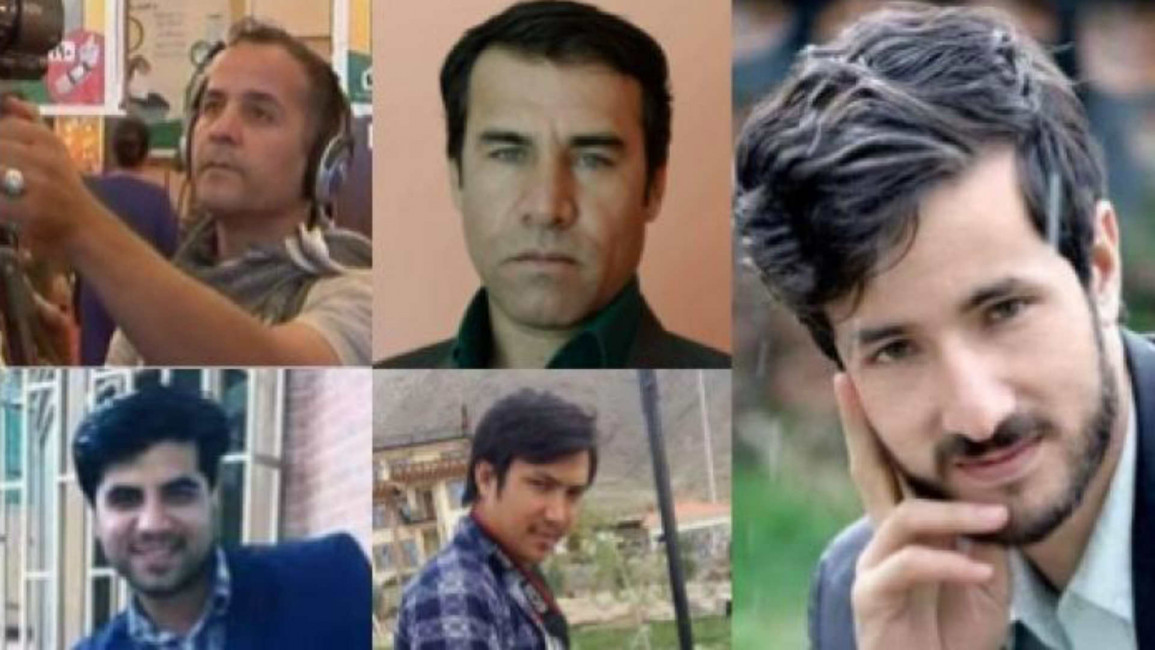
The deadliest day for Afghan journalists in 16 years
The deadliest day for Afghan journalists in 16 years
Blog: Two separate incidents targeting journalists in Afghanistan left at least 10 media workers dead.
2 min read
Some of the Afghan journalists killed on Monday [Reporters Without Borders]
At least ten journalists were killed on Monday in Afghanistan, the deadliest day for the profession in the war-torn country since the fall of the Taliban in 2001.
Nine journalists were killed early Monday after a suicide bomber disguised himself as a journalist and detonated himself among a crowd of people in Kabul. The blast, which followed an earlier one minutes before, appears to have deliberately targeted reporters arriving at the scene.
Among the dead were three journalists from the Afghan-based oulet Azadi, including Mahram Durani, Ebadullah Hananzai, Sabawoon Kakar; two journalists from 1TV, including Ghazi Rasooli and Nowroz Ali Rajabi; two journalists from Mashal TV, including Saleem Talash and Ali Saleemi; TOLOnews jourrnalist Yar Mohd Tokhi and AFP photojournalist Shah Marai.
There were journalists who were also badly injured, including Al Jazeera's Naser Hashemi, Reuters' Omar Soltani, Nedai Aghah's Ahmadshah Azimi, Vahdat Mili's Ayar Amar and Mivand's Davod Ghisanai.
At least 16 others who were not journalists were also killed in the Kabul twin blasts. Their names have not been released as of writing.
In a separate incident on Monday, BBC journalist Ahmad Shah was killed in the country's Khost province on his way home from work.
Shah had worked for the British broadcaster for two years, and the BBC World Service director Jamie Angus called him "highly capable" and "popular" among colleagues.
Monday's attacks killed more journalists than any other single attack since the Taliban's fall in 2001. Previously, a January 2016 bombing killed seven journalists from Tolo TV.
"This latest attack on journalists in Afghanistan is a reminder of the extreme dangers to media workers in that country and of the extremely brutal tactics used there by enemies of the free press," said Steven Butler, the Committee to Protect Journalists Asia program coordinator.
After news of the deaths spread on social media, a 2016 personal essay by the AFP's Marai capturing the difficulties of life in war-torn Afghanistan was widely circulated.
"But there is no more hope. ... I don't dare to take my children for a walk. I have five and they spend their time cooped up inside the house. Every morning as I go to the office and every evening when I return home, all I think of are cars that can be booby-trapped, or of suicide bombers coming out of a crowd. I can't take the risk," he wrote.
"I have never felt life to have so little prospects and I don't see a way out. It's a time of anxiety."
Follow us on Twitter: @The_NewArab
Nine journalists were killed early Monday after a suicide bomber disguised himself as a journalist and detonated himself among a crowd of people in Kabul. The blast, which followed an earlier one minutes before, appears to have deliberately targeted reporters arriving at the scene.
Among the dead were three journalists from the Afghan-based oulet Azadi, including Mahram Durani, Ebadullah Hananzai, Sabawoon Kakar; two journalists from 1TV, including Ghazi Rasooli and Nowroz Ali Rajabi; two journalists from Mashal TV, including Saleem Talash and Ali Saleemi; TOLOnews jourrnalist Yar Mohd Tokhi and AFP photojournalist Shah Marai.
There were journalists who were also badly injured, including Al Jazeera's Naser Hashemi, Reuters' Omar Soltani, Nedai Aghah's Ahmadshah Azimi, Vahdat Mili's Ayar Amar and Mivand's Davod Ghisanai.
At least 16 others who were not journalists were also killed in the Kabul twin blasts. Their names have not been released as of writing.
Twitter Post
|
In a separate incident on Monday, BBC journalist Ahmad Shah was killed in the country's Khost province on his way home from work.
Shah had worked for the British broadcaster for two years, and the BBC World Service director Jamie Angus called him "highly capable" and "popular" among colleagues.
Monday's attacks killed more journalists than any other single attack since the Taliban's fall in 2001. Previously, a January 2016 bombing killed seven journalists from Tolo TV.
"This latest attack on journalists in Afghanistan is a reminder of the extreme dangers to media workers in that country and of the extremely brutal tactics used there by enemies of the free press," said Steven Butler, the Committee to Protect Journalists Asia program coordinator.
After news of the deaths spread on social media, a 2016 personal essay by the AFP's Marai capturing the difficulties of life in war-torn Afghanistan was widely circulated.
"But there is no more hope. ... I don't dare to take my children for a walk. I have five and they spend their time cooped up inside the house. Every morning as I go to the office and every evening when I return home, all I think of are cars that can be booby-trapped, or of suicide bombers coming out of a crowd. I can't take the risk," he wrote.
"I have never felt life to have so little prospects and I don't see a way out. It's a time of anxiety."
Follow us on Twitter: @The_NewArab




